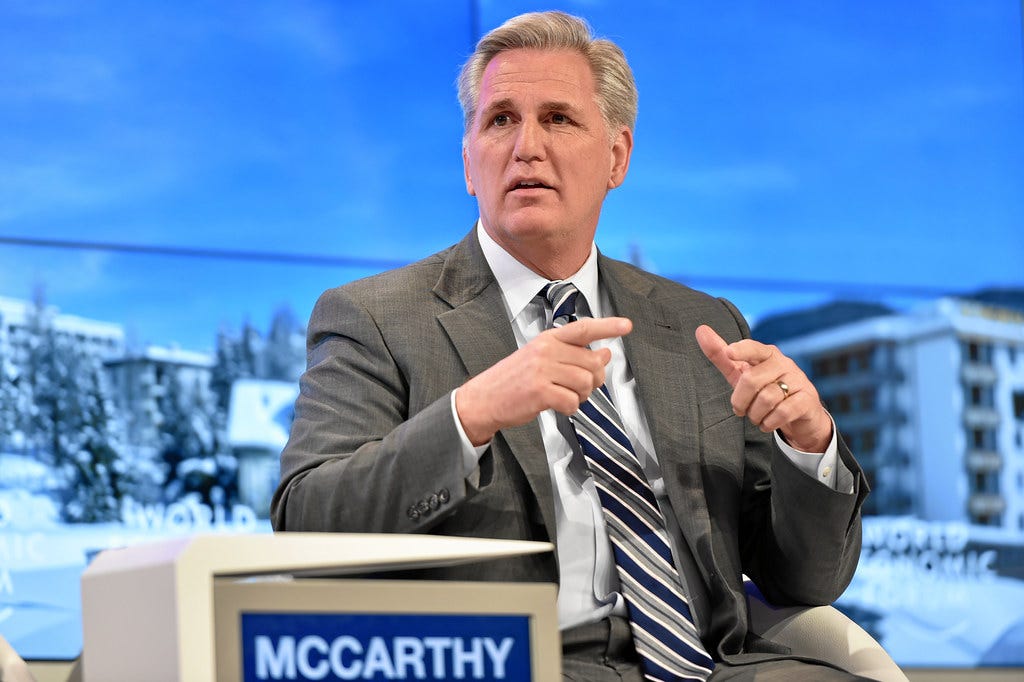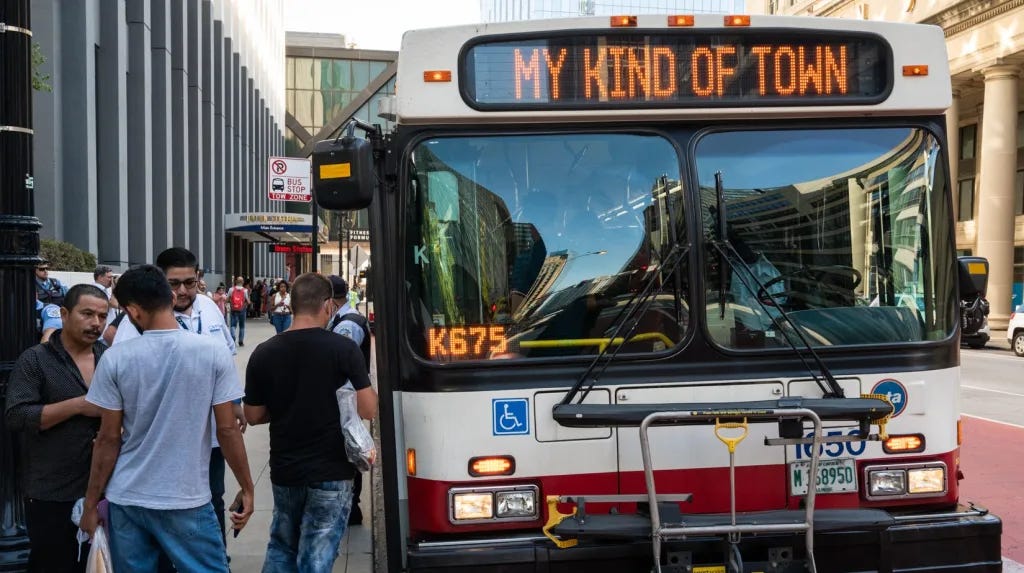This is what democracy looks like
Some have called Rep. Matt Gaetz's ouster of now-former Speaker of the House Kevin McCarthy an act of chaos. But Gaetz's actions, whatever their motivation, show a path forward for real change.
Admittedly, I don’t get to as many protests as I used to. With six children, a congregation to pastor, and greater desire for quiet that attends my age, it just doesn’t usually work out.
Former Speaker of the House Kevin McCarthy
But, I remember my more active protest days. Amid the cacophony of a bustling freedom fighters, a poignant chant echoed from one corner of the crowd, "Tell me what democracy looks like!" The fervent response, "This is what democracy looks like!" was thunderous, resonating deep into the very ethos of what our nation stands for. The rhythm of that chant has been playing in my mind recently, especially after observing the tumultuous events in Congress.
No matter where you stand politically, it's impossible to ignore the masterclass Representative Matt Gaetz provided on how individual conviction, combined with political strategy, can dramatically shift the balance of power. Although I may find myself at odds with Gaetz on a myriad of policy issues, his audacity to wield influence should serve as a clarion call, not just to Democrats but to every individual believing in the cause they champion. In essence, Gaetz exemplifies what our chant declared: "This is what democracy looks like."
For context, Gaetz recently orchestrated an historic challenge to Speaker Kevin McCarthy, culminating in McCarthy's unprecedented ouster. I don’t read in this story a simple tale about internal party dynamics and personal vendettas (there’s plenty of that here). But, there is also a narrative about how a single member of Congress, armed with a lot of resolve and a little bit of strategy, can reshape the political landscape.
Florida Rep. Matt Gaetz
And here lies the lesson — not in the specifics of the power play, but in its broader implications. Democratic voters, and indeed voters of all affiliations, should hold their representatives to this exemplified standard. If a single individual can precipitate such change, imagine the seismic shifts possible when our representatives collectively stand firm on issues like voting rights, the child tax credit, and education.
Our democracy thrives when its representatives are not just partisan placeholders, but are instead champions for a cause and agents of change. The recent developments in the House show that members don't need to be in the majority to make a difference. They simply need the courage of their convictions and the will to act, even against establishment power. This isn't a call for confrontation for confrontation's sake but instead a call for unyielding dedication to the causes constituents hold dear.
Consider voting rights — the cornerstone of our democracy. Accessible and fair voting is not a partisan issue; it's a fundamental right. Yet, we've seen legislative gridlock and inertia. If the representatives who hail from cities like Chicago could harness even a fraction of Gaetz's determination, transformative policies ensuring every citizen's right to vote could be solidified.
Then there's the expanded child tax credit, a crucial provision that for a brief time freed millions of children from the clutches of poverty. This tax credit was not mere policy; it was a lifeline for countless families. Imagine if, when senators insisted the tax-credit be cut from a must-pass pandemic response bill, a handful of bold, family-conscious legislators showcased unwavering commitment, even to the chagrin of party leaders and the corporate press. That group of relatively obscure members could have ensured that a provision designed to change the course of American children’s lives for the better was not relegated to the uncertain realm of political bargaining chips but recognized as an essential, non-negotiable instrument of security for families and communities.
The same could be said for education — the bedrock of our future. Ensuring equitable access to quality education shouldn't be mired in bureaucracy or politics. It demands leaders willing to put everything on the line, much like Gaetz did, albeit for different reasons.
The church can glean insights from this episode. Faith institutions, anchored in community service and social justice, must also re-evaluate their commitment to the causes they champion. Just as Gaetz displayed his unwavering commitment to his cause, faith leaders should display a similar unwavering commitment to justice, equality, and the welfare of their communities. We are not members of the House of Representatives, but we are players in this thing called democracy. We have votes, platforms, and endorsements that we can and should withhold for the advancement of our righteous cause for justice and order in accordance with the scriptures we hold dear.
Some will say that Gaetz has caused chaos, that he should never have moved to vacate the Speakership because he does not know who will fill the position. But I say that Gaetz has demonstrated what it means to use the power that you have. There is no one member, leader, or even community that can solve every problem in our country, but in the words of that English activist and revivalist, John Wesley, “Do all the good you can, by all the means you can, in all the ways you can, in all the places you can, at all the times you can, to all the people you can, as long as ever you can.”
We can join the chorus of voices who chose to bemoan the audacity of a congressman with whom they disagree. Or we can learn from these events and begin to urge our representatives and challenge ourselves to channel that same audacity for causes we care about. It's high time we recognized the latent power resting with our elected officials and within our own communities to fight for and win transformative change.
Democracy is not a passive construct — it's dynamic, vibrant, and molded by those who have the courage to shape it. Gaetz's maneuvers have, even if inadvertently, provided a template. The onus is on us and our representatives to apply it for the collective good.
After all, this— this unwavering commitment to cause and community, this audacity to challenge and change — is truly what democracy looks like.
Do you have ideas for future Civic Update stories or want to contribute a story yourself? Email our editor by clicking the button below!
The Round Up
Here are the stories that caught our eyes this week and what they mean for the weeks ahead.
Mayor Johnson creates new position devoted to anti-homelessness measures
Chicago Mayor Brandon Johnson has increased efforts to alleviate homelessness and housing insecurity by bringing on the city’s first executive tasked exclusively with addressing the issue.
Johnson signed an executive order establishing the role. Whomever he appoints will be charged with devising solutions “for stable, permanent and affordable housing.”
Push to end subminimum wages for tipped workers heads to city council vote Friday
A Chicago City Council vote to nix the “subminimum wage” for tipped workers has been pushed to Friday due to an an error in publishing the ordinance 48 hours in advance.
The One Fair Wage ordinance, brought forward by Ald. Jessie Fuentes (26th), seeks to help tipped employees by raising their hourly minimum wage to $15.80 an hour, matching the minimum wage for non-tipped workers. If approved, the tipped wage would phase out over the next five years.
Chicago Mayor Brandon Johnson planning southern border trip; Migrants dropped off at Willis Tower
Officials with the Department of Homeland Security met with Chicago Mayor Brandon Johnson and several City Council members Thursday talk through and plan his upcoming trip to the southern border.
More buses of migrants continue to arrive in Chicago not far from Union Station as the immigration crisis grows.
DHS officials will be looking at possible housing sites around the city for asylum seekers to move into in the near future.
Newsclips
‘Young Love’ series portrays West Side family’s modern-day life in Chicago
Activists rally for removal of lead pipes in Chicago
Chicago residents file lawsuit to stop using public buildings to house migrants
Illinois man sentenced for role in Jan. 6 riot
‘Hillbilly Elegy’ senator rebuffs Sen. Dick Durbin’s 4th bid to confirm Chicago federal prosecutor
These are the richest people in Illinois, according to Forbes
Loop office woes could soon hit Chicago homeowners' pocketbooks
Pot shop zoning proposal would give Chicago City Council more control











Informative, as always. That said, the defense of Matt Gaetz is, well, problematic. The best that can be said, I think, is that God can draw good out of...a hot mess! And his doing so involves our repentance. A general point: "by any means necessary" is too close for comfort to "the end justifies the means." Not so, when the means is the end in its becoming. E.g., terrorism merges into tyranny.